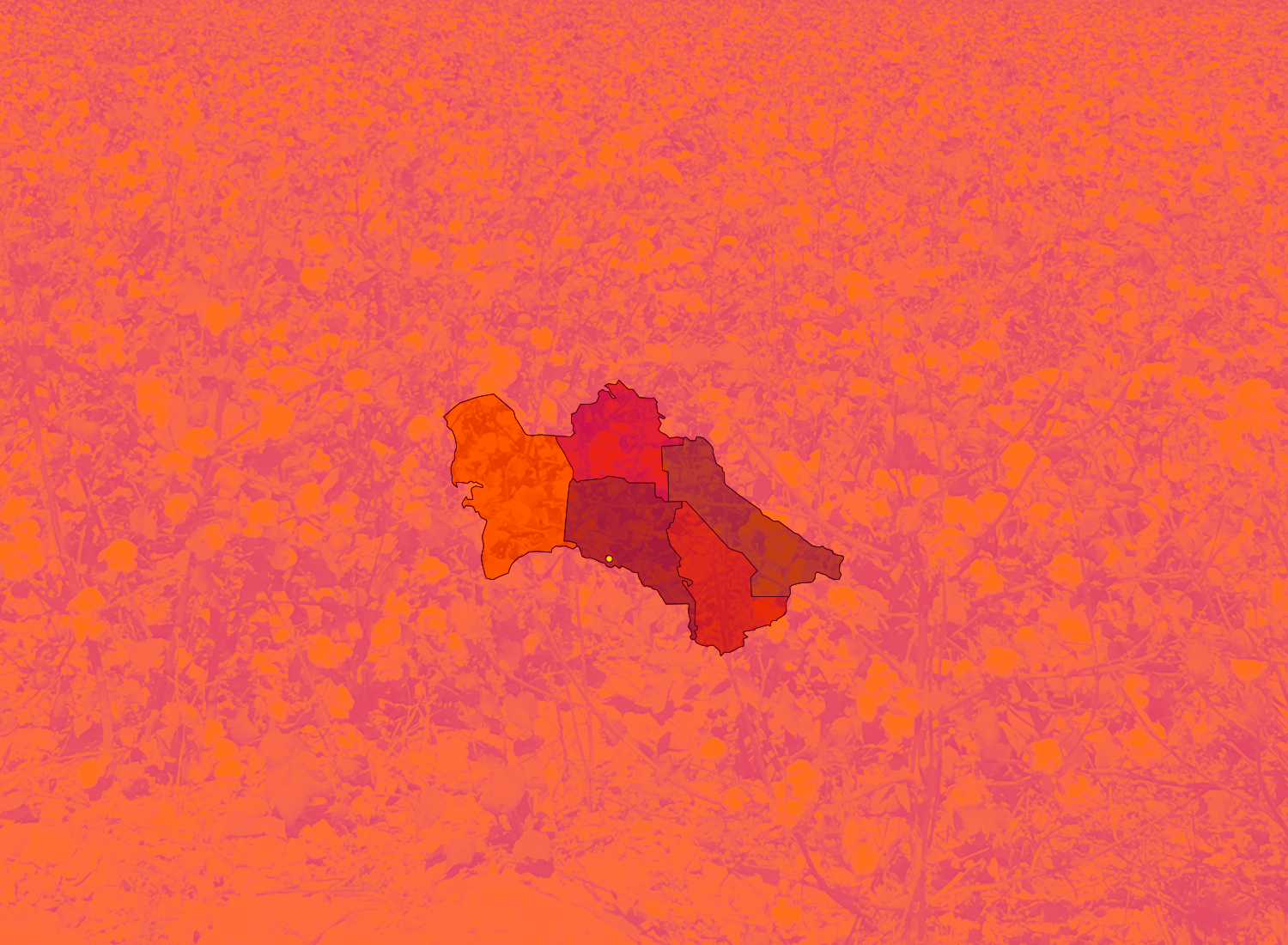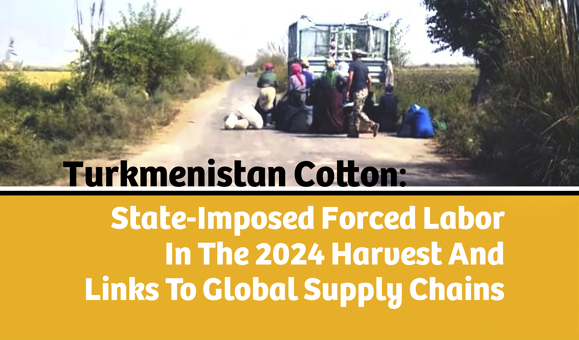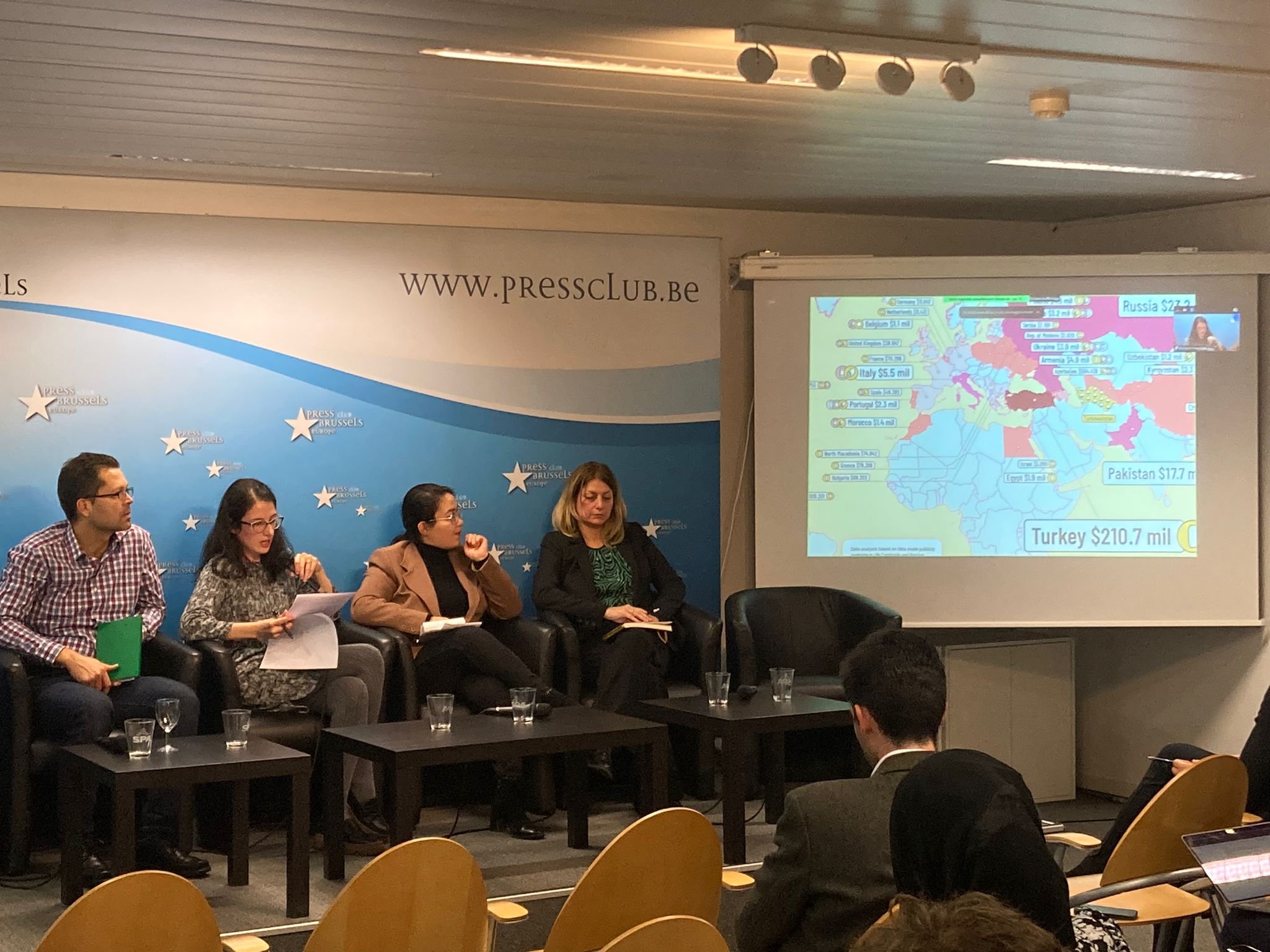
Leading the Fight Against State-Imposed Forced Labor in the Cotton Fields of Turkmenistan
Systemic state-imposed forced labor in the annual cotton harvest
Turkmenistan is one of the most repressive countries in the world. It exerts control over all aspects of public life and severely represses all civic freedoms. The government uses widespread and systematic state-imposed forced labor in the annual cotton harvest. Every year between August–November, public authorities force state employees to pick cotton or pay for replacement pickers under threat of penalty, including loss of employment or reduction of work hours or pay. The Turkmen government maintains complete control over the cotton production system: it establishes an annual production quota, sets the price at which it will purchase cotton from farmers, and determines the prices for machinery and inputs. Cotton production quotas are enforced on farmers under the threat of penalty, including fines, destruction of private vegetable crops, and loss of land.
Following a decade of independent civil society monitoring of the harvest and policy advocacy by the Cotton Campaign and its partners, the Turkmen government has taken some preliminary steps towards addressing the use of systemic state-imposed forced labor in the harvest. In 2021, the government accepted engagement with the ILO and since then, it signed two consecutive Roadmaps for Collaboration. In the 2023 and 2024 harvests, it took some steps to reduce forced labor in the harvest. The Cotton Campaign coalition welcome these developments.
However, it is still unclear if the Turkmen government has the political will necessary to eradicate forced labor. Not only does it continue to use widespread and systematic forced labor of state employees, but it also suppresses fundamental rights and freedoms, including freedoms of movement, expression, and association–which are critical to combat forced labor and ensure sustainable reforms. All civil society organizations that are publicly critical of this repressive regime, including Cotton Campaign’s partners Turkmen.News and the Turkmen Initiative for Human Rights, must work from exile, and the independent labor monitors and informants who provide evidence of forced labor conditions during the harvest, do so at great personal risk.
Turkmen cotton: high risk cotton in global supply chains
Global brands and retailers face the risk of forced labor Turkmen cotton entering their supply chains at all stages of production. Turkmenistan exports cotton fiber, as well as semi-finished and finished cotton goods. Turkmenistan does not import cotton, which means that all cotton products exported by Turkmenistan are made with cotton produced within a state-imposed forced labor system. Türkiye is a primary importer of cotton yarn and fabric from Turkmenistan. Pakistan, but also Italy, Poland, and Portugal, among others, are other third countries where manufacturers use Turkmen cotton products in the production of finished goods.
To comply with laws governing supply chains and imports, such as the Withhold Release Order (WRO) against Turkmen cotton in the US, the import ban on forced labor products in Canada, and upcoming forced labor legislation in the European Union, companies must map out their entire textile supply chains, down to the raw material level, and eliminate all cotton originating in Turkmenistan.
Recommendations
-
Enforce national laws that prohibit the use of forced and child labour in alignment with ILO conventions.
Issue public, high-level policy statements condemning forced labour and explicitly prohibit the use of coercion to mobilize anyone to work, or to hire pickers, pay for replacement pickers or otherwise finance the picking of cotton - such as via a presidential decree or instruction.
Take action to hold officials accountable for mobilizing and extorting citizens and provide remedy for those affected.
Fully cooperate with and implement recommendations from UN treaty bodies, UN Special Procedures, and ILO Supervisory Mechanisms, including recent recommendations from the ILO Committee on the Application of Standards (CAS), the ILO Committee of Experts on the Application of Conventions and Recommendations, the UN Committee on the Rights of the Child, and the UN Committee on the Elimination of Discrimination against Women.
Ensure that independent labor monitors, independent trade unions, journalists, and human rights defenders can operate freely to document and report labor conditions without fear of reprisal.
The government of Turkmenistan should protect civic freedoms and ensure that forced labor reforms involve the broader enabling of fundamental rights such as freedom of expression and freedom of association. In this pursuit and beyond, it should meaningfully involve international independent social partners in the reform process. This is in line with the 2024 Conclusions of the ILO CAS, which called on the government of Turkmenistan to engage with independent social partners as a critical element to ensuring the full application of the Convention 105 on the Abolition of Forced Labour.
The government should also publicly report on concrete measures taken and tangible results achieved to eliminate state-imposed forced labour and child labour, including on the specific goals committed to in the framework of the roadmap of cooperation activities between the ILO and the Government of Turkmenistan for 2024-2025.
-
Foreign governments should increase pressure on the Turkmen government to eliminate forced labor by employing both a human and labor rights framework in accordance with UN and ILO conventions and standards, and a human rights due diligence framework, consistent with national laws governing human rights due diligence, supply chains, and imports, which require global companies to not source products made with forced labor.
Governments should reinforce with the Turkmen government, in bilateral and multilateral human rights dialogues, that forced labor must be eliminated. They should support labor and human rights defenders in Turkmenistan, including by raising concerns about ill-treatment against them, meeting with labor and human rights defenders, and publicly expressing concerns when people are harassed for conducting human rights work.
Governments should also use their “voice and vote” at the World Bank, Asian Development Bank, European Bank for Reconstruction and Development, and other international finance institutions to prevent any investment that directly or indirectly contributes to Turkmenistan’s forced labor cotton production system. Domestically, governments should introduce and enforce import controls on products made (in whole or in part) or transported with forced labour, which would allow for the prohibition of products containing Turkmen cotton. Governments should also enact mandatory human rights and environmental due diligence legislation, which require all forms of business enterprises to conduct human rights due diligence in their value chains, and map and disclose their supply chains. Crucially, laws should hold companies accountable for preventing human rights abuses in their value chains.
Specifically:
The European Union, in negotiations on the Omnibus CS3D text, should retain the Articles of the CS3D that included the need to terminate business relationships where there is no reasonable expectation that efforts will succeed, such as in situations of state-imposed forced labor.
The European Union, in the development of guidelines and reviews of the Forced Labour Regulation, should allow for guidelines on ending and remediating forced labor to recognise the need for full disengagement from state-imposed forced labor, for information from civil society reports to be included as a source of information in the database, and for future amendments to enable regional/industry-wide bans in cases of state-imposed forced labor.
The US Customs and Border Protection Agency (CBP) should detain all shipments of goods containing cotton products from Turkmenistan and publish the list of detentions made and the value of the shipments detained under the WRO. It should also develop a strategy to identify and review shipments of cotton products from suppliers in third countries — including but not limited to Türkiye, Pakistan, Poland, and Italy — that import cotton and semi-finished cotton goods from Turkmenistan. The onus should be on importers to show that they have no exposure to Turkmen cotton.
CBP should work together with the office of the US Trade Representative, Canada Border Services Agency, and Employment and Social Development Canada to encourage enforcement of the labor provisions of the USCMA and ensure that products subject to the WRO over Turkmen forced labor cotton allegations are not permitted to enter Canada.
The Canada Border Services Agency should publicly recognize cotton goods originating in Turkmenistan or containing Turkmen cotton as goods produced with state-imposed forced labor and introduce a country wide ban against cotton from Turkmenistan, similar to the US WRO. It should also publish the list of detentions made and the value of the shipments detained under the Customs Tariff item No. 9897.00.00; and work together with US and Mexico counterparts to ensure enforcement of the USMCA forced labor provisions, and that products subject to the US WRO on Turkmen forced labor cotton are prohibited from entering Canada.
-
The ILO should meaningfully consult with independent international social partners, such as the ITUC and the IUF, in all stages of its monitoring work and roadmap development and implementation in Turkmenistan, including in the process of negotiating a new Roadmap for 2026 onwards.
In addition, recognizing the severe restrictions on independent organizations inside of Turkmenistan, the ILO should regularly consult with the Cotton Campaign and its independent Turkmen civil society partner organizations.
In its discussions with the Turkmen government, the ILO should raise concerns about the safety and access of independent monitors publicly and at the highest levels, and make clear that their ability to work unimpeded is a vital sign of the government’s good faith and a requirement for ILO assistance. It should also make clear that ending state-imposed forced labor in Turkmenistan requires a broader enabling of all the Fundamental Rights at Work, including freedom of association and collective bargaining, and that other civil and political rights such as freedom of expression are critical to addressing root causes of forced labor.
-
Prohibit the use of cotton from Turkmenistan in their products and sign the Turkmen Cotton Pledge to demonstrate their public commitment to eliminate any Turkmen cotton from their products as long as Turkmen cotton is produced with state-orchestrated forced labor.
Immediately terminate all direct sourcing relationships with Turkmen suppliers, and map their supply chains to the raw materials level to ensure their products are free from cotton originating in Turkmenistan. This requires going beyond existing references to “zero tolerance of forced labor” or other similar language in supplier requirements and proactively engaging with direct suppliers, as well as the spinning and fabric mills in their supply chains.
-
Urge companies that use cotton to sign the Turkmen Cotton Pledge and publicly commit to not using Turkmen cotton in their products.
Urge companies to address current or potential links to the forced labor system of cotton production in Turkmenistan in the companies’ operations and supply chains.
Cease investments in companies that refuse to discontinue using cotton from Turkmenistan while it is produced with forced labor.
Support the advocacy efforts of the Cotton Campaign and its partners, and publicly endorse calls to policy makers and international organizations to take stronger action against forced labor in cotton production in Turkmenistan.
Protest against forced labor in Turkmenistan cotton, New York, 2018
School and kindergarten teachers arrived to a cotton field in the back of a truck, Dashoguz region, 2022
School and kindergarten teachers submit cotton to be weighed, Dashoguz region, 2022
Turkmenistan Cotton: New Reporting Reveals Systemic Forced Labor, Despite Some Steps By Government To Reduce Mobilization
Global Brands At Risk Of Sourcing Forced Labor Turkmen Cotton Through Suppliers In Türkiye And Pakistan, Among Others
(Washington, DC, May 21, 2025) The government of Turkmenistan should expand the preliminary measures it took in the 2024 harvest to reduce forced labor through reforms that address root causes, empower workers and farmers, and allow independent monitoring and reporting, the Cotton Campaign said. The call comes as today the Cotton Campaign's frontline partners Turkmen.News and Turkmen Initiative for Human Rights released their findings of independent civil society monitoring of the 2024 cotton harvest in Turkmenistan. The report, "Turkmenistan Cotton: State-Imposed Forced Labor In The 2024 Harvest And Links To Global Supply Chains" shows that despite some initial steps to address forced labor, such as not mobilizing doctors and teachers in some workplaces and increasing the picking rates to incentivise voluntary picking, state-imposed forced labor remained widespread and systematic. Public authorities and heads of state institutions continued to mobilize public sector employees to pick cotton or extort them to pay for replacement pickers. The report launched today also exposes government interference with ILO monitoring of the 2024 cotton harvest and retaliatory action against the director of Turkmen.News.
“It is positive that the Turkmen government has taken some preliminary measures to reduce forced labor in the harvest, after a decade of sustained independent monitoring and reporting, advocacy, and campaigning by Turkmen NGOs operating from exile and international labor and business groups,” said Raluca Dumitrescu, Senior Coordinator of the Cotton Campaign coalition. “However, dismantling the forced labor system requires not just changes to mobilization of pickers, but also reforms that emphasise fundamental human and labor rights. The Turkmen government must stop punishing activists who speak out about abuses in the cotton sector and should take concrete steps to empower workers and farmers.”
Forced Labor Turkmen Cotton in Global Supply Chains
Cotton made with state-imposed forced labor in Turkmenistan enters global textile supply chains, in violation of import ban legislation and obligations on companies not to use goods made with forced labor.
Turkmenistan has a vertically integrated cotton industry.Brands and retailers face the risk of cotton made with state-imposed forced labor in Turkmenistan entering their cotton supply chains at all stages of production. Suppliers in third countries, in particular Türkiye, but also Pakistan and Italy, among others, use cotton, yarn, and fabric originating in Turkmenistan.
Turkmenistan does not import cotton, which means that all cotton products exported by Turkmenistan are made with cotton produced within the state-imposed forced labor system. This repressive system makes it impossible for brands and retailers to conduct any credible due diligence on the ground to prevent or remedy forced labor. For this reason, to comply with current and upcoming laws governing imports and human rights due diligence in supply chains, companies must map out their entire textile supply chains, down to the raw material level, and eliminate all cotton originating in Turkmenistan.
The Cotton Campaign Coalition has conducted supply chain research into specific trade flows through which forced labor Turkmen cotton and cotton products enter global supply chains and markets. Highlights of this research are provided in the map above (2022). The report Turkmenistan Cotton: State-Imposed Forced Labor In The 2024 Harvest And Links To Global Supply Chains (2025) presents the most recent findings.
-
Given that the Turkmen government uses systemic state-imposed forced labor, it is impossible for brands and retailers to conduct any credible due diligence on the ground to prevent or remedy forced labor. For this reason, to comply with current and upcoming laws governing imports and human rights due diligence in supply chains, companies must map out their entire textile supply chains, down to the raw material level, and eliminate all cotton originating in Turkmenistan.
-
Trade data released annually by UN Comtrade shows that each year between 2020-2023, exports of cotton and semi-finished cotton products to Türkiye made up on average 84% of Turkmenistan’s total exports of cotton products.

The Turkmen Cotton Pledge
Almost 150 brands and retailers have signed the Pledge and committed to not use Turkmen cotton in their products because it is produced with state-imposed forced labor.
News
Resources










![Disengagement In Cases Of State-Imposed Forced Labor [OECD Side Session]](https://images.squarespace-cdn.com/content/v1/618550501fe9be0ff3428860/1741683823580-AKTCVG4VOZCYBL91C8VL/Picture%2B4.jpg)




![German Businesses Should Cut Ties With Turkmenistan’s Textile Industry [Cotton Campaign Correspondence With German Business Association]](https://images.squarespace-cdn.com/content/v1/618550501fe9be0ff3428860/1690274874970-Q51FTO081GFS4LWNNI7Z/Screenshot%2B2023-07-25%2Bat%2B10.14.36.jpg)


